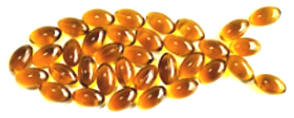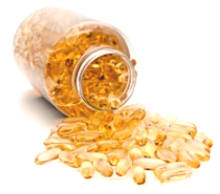
Fat axit Omega-3 brings a lot of health benefits.
The best way to get omega-3 is to eat fatty fish at least twice a week.
If you do not regularly eat fatty fish, consider using additional products.
However, it is very important to remember that your supplement must contain EPA and DHA.
EPA and DHA are the most useful types of omega-3 found in fatty fish and algae.
This article will cover the amount of omega-3 (EPA and DHA) you need to have the healthiest body.
Instructions for standard Omega-3 dosages
There is no standard for daily intake of omega-3.
There are many conflicting opinions given by experts from different mainstream medical organizations.
But in general, most organizations recommend taking a minimum of 250-500 mg EPA and DHA daily for healthy adults .
However, people with certain health conditions are recommended to consume higher amounts of omega-3.
Conclude: To date, there is no official standard for omega-3 intake every day. However, most health organizations agree that 250-500 mg both EPA and DHA are sufficient for adults to maintain overall health.
Omega-3 for certain health conditions

Below is a summary of the dosage used:
Heart health
One trial included 11,000 participants using EPA and DHA at a dose of 850 mg daily for 3.5 years. As a result, heart attacks have decreased by 25% and sudden death has decreased by 45% .
Many organizations, including the American Heart Association (AHA), recommend patients with coronary artery disease should take 1,000 mg. They also recommend that patients with high triglycerides should take between 2000 and 4000 mg EPA and DHA daily .
However, some large evaluation studies have not been able to detect any benefits of omega-3 fatty acids for people with heart disease .
Depression and anxiety
Studies have shown that with high doses of omega-3, between 200-2,200 mg daily, may help reduce symptoms of depression and anxiety .
In the case of emotional and mental disorders, a supplement with higher EPA levels than DHA may be the optimal choice.
Cancer
Fish supplementation and omega-3 fatty acids may help reduce the risk of breast cancer, prostate cancer and colon cancer .
However, there are still no standards for optimal dosage to reduce the risk of cancer.
Other diseases
Omega-3 fatty acids may be helpful for many other health problems. The effective dose depends on many factors.
Conclude: Omega-3 fatty acids can help with many conditions. According to scientific research has demonstrated, the most effective dose is from 200 to 4,000 mg.
Omega-3 for children and pregnant women

Research shows that omega-3 fatty acids, especially DHA, are important during the period before, during and after pregnancy .
Almost all official standards recommend pregnant and lactating women that in addition to taking an amount for adults, mothers should add 200 mg of DHA .
Several global and national organizations have announced standards for infants and young children between 50 and 100 mg EPA and DHA daily .
Conclude: Pregnant and lactating mothers are recommended to add 200 mg of DHA. The recommended dosage for infants and young children is 50-100 mg EPA and DHA daily.
Omega-6 intake can affect the need for Omega-3 supplements

A typical Western diet usually contains 10 times more omega-6 than omega-3. Omega-6 fatty acids are mainly from refined vegetable oils, oils commonly found in processed foods .
Many experts believe that if you want a healthy body, the ratio of omega-3: omega-3 should be around 2: 1 .
Omega-6 and omega-3 fatty acids all need the same enzyme so that these fatty acids are converted into activated forms .
Therefore, the body's need for omega-3 supplements may depend on the amount of omega-6. If you already consume a lot of omega-6 then you need to supplement an even larger amount of omega-3.
Conclude: The human body can work well when balanced with omega-6 and omega-3. The more omega-6 fatty acids you eat, the more omega-3 you need.
Too much Omega-3 can also be harmful

On the other hand, the European Food and Drug Administration (EFSA) claims that 5,000 mg of omega-3 every day from supplements is safe.
These warnings are given for several reasons. Firstly, omega-3 can cause blood thinning or bleeding in some people.
For this reason, many organizations recommend those who are planning surgery to stop taking omega-3 supplements one or two weeks before surgery.
The second reason is vitamin A. In high doses, vitamins can become toxic, and some omega-3 supplements (such as cod liver oil) have very high levels of vitamin A.
Finally, no studies have shown that taking more than 5,000 mg of omega-3 can provide any additional benefit. So you should not risk taking too much.
Conclude: Drinking the most 3,000-5,000 mg of omega-3 per day is still considered safe for the body, although most people do not need such high levels of omega-3.
Dosage of omega-3 functional foods

Please carefully read the label of the functional food containing omega-3 to know the content of EPA and DHA in it.
The dose of these 2 substances on the product packaging is often embarrassing. For example, the packaging of a product may contain 1,000 mg of fish oil, but in fact it contains much less.
Depending on the concentration of EPA and DHA in one dose, you may need to take up to 8 tablets to reach the recommended amount.
I personally use only 500 mg EPA and DHA from functional foods only, with as little as possible.
Conclude: You should not only care about fish oil, but also consider how much EPA and DHA in supplement. This will help you control your intake of EPA and DHA
Things to remember
Follow the instructions on the omega-3 supplement label.
However, keep in mind that different people have different omega-3 needs. Some people may need more than others.
You should only supplement omega-3 not to exceed the range from 250 mg to 3000 mg EPA and DHA every day, unless otherwise indicated by a medical professional.
